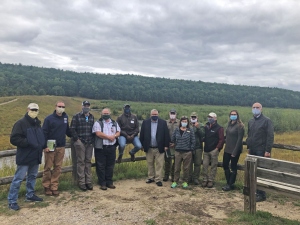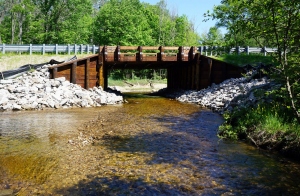
Conservation partners and USDA Deputy Undersecretary, Bill Northey gather for a tour of the Boardman River’s Brown Bridge restoration site in September.
The Regional Conservation Partnership Program (RCPP) is a bona fide catalyst for conservation. A bipartisan effort introduced by Senator Debbie Stabenow (D-MI) and her colleagues as part of the 2014 Farm Bill, the new program invests in regional coalitions to solve conservation challenges affecting agriculture and the environment. Starting with a $8 million investment in 2016, and an added boost of $4 million in 2019, the initiative has since completed 42 stream restoration projects throughout northern lower Michigan and targeted 2,500 acres for permanent protection in the greater Grand Traverse region. We are thrilled to share that the RCPP was recently renewed for an additional $5.7 million.
With leadership from the Grand Traverse Band of Ottawa & Chippewa Indians, the Tribal Stream and Michigan Fruitbelt Collaborative members include nineteen other tribal, federal, state, and local government agencies along with nonprofit organizations primarily developed and led by the Conservation Resource Alliance, Grand Traverse Regional Land Conservancy, Leelanau Conservancy, and Grand Traverse Conservation District. Our shared goals are to protect farms and forests from development in high-risk areas and restore the high-quality streams that support tribal fisheries and comprise the backbone of resiliency for the Great Lakes.

Funding from the RCPP helped to construct a new timber bridge last year at E. Duck Lake Road and Mason Creek in the Betsie River Watershed.
“The word “collaborative” almost seems insufficient to describe the relationships built here,” the Band’s Brett Fessell said of the partnership. “We are a true restoration alliance.”
The group’s moniker reflects the Anishinaabek people’s deep connection to free-flowing, healthy streams for economic, subsistence, spiritual, and cultural well-being and the area’s rich heritage in fruit cultivation. Take a drive through our rural backroads and you’ll find stunning views of rolling cherry orchards, grape vineyards, countless forests, and expansive vistas of Lake Michigan. The area’s intrinsic beauty, however, attracts development pressure, which threatens farms and the same natural features that make northwest Michigan extraordinary.
For five decades, CRA and our partners have mitigated the negative impacts of Michigan’s historic logging and transportation industries, which left many of our rivers fragmented, bare, and troubled with erosion. Reconnecting these broken streams is a crucial step toward revitalizing rivers and improving northwest Michigan’s fishery – vital to maintaining a traditional way of life for Indigenous people.
Farms play an important role in preserving water quality, too. Northwest Michigan’s specialty crop growers often have long-rotation production cycles creating a landscape filled with mature fruit trees as well as wetlands and forests on their properties. These lands protect rain infiltration – an essential process that recharges groundwater-fed streams and safeguards waterways and drinking water from excess pollutants associated with development.
In turn, protecting water quality and restoring aquatic habitats underpins agriculture and another major, interdependent section of Michigan’s economy – tourism. Tourism helps to keep agriculture viable in the Fruitbelt, while a robust agriculture industry promotes tourism. And both industries rely on the clean, high-quality waters of the Great Lakes Basin.
The federal funding requires a one-to-one local contribution, which the partners have readily provided; more than $30 million has been contributed so far. With this strong, collaborative focus of energy and resources, the RCPP will help to protect thousands of precious farmland acres and restore dozens of stream miles, and will leave a lasting impact on the region. “It is truly unprecedented how much on-the-ground conservation work is being completed in a relatively short, 10-year period,” CRA Director, Amy Beyer reflected on the project. “And it is all due to three key ingredients: good science, careful coordination, and trust among local partners.”
